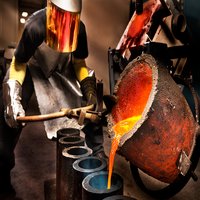How Policy-Makers can Solve the Investment Dilemma Faced by Energy-Intensive Manufacturers and Facilitate Industrial Climate Protection
Study by Wuppertal Institute and Agora Energiewende

Study by Wuppertal Institute and Agora Energiewende

Climate protection is already a major consideration in the investment decisions made by steel, chemical and cement manufacturers. Indeed, if companies in these sectors were to ignore the climate impacts of their long-term investment decisions, significant financial losses could result, given the likelihood of more stringent environmental regulations in coming years. While various climate-neutral production technologies already have a high stage of maturity, their large-scale deployment has been hampered by the lack of a conducive regulatory environment. In a new study, Agora Energiewende and the Wuppertal Institute therefore propose an immediate action programme to make German manufacturers a vanguard in green hydrogen, industrial electrification and the abatement of process emissions.
Germany has yet to adopt a targeted climate and innovation policy for the basic materials industry. As a result, investment in this sector, which employs some 550,000 people, could suffer a massive decline. The EU's long-term target of greenhouse gas neutrality by 2050 cannot be achieved without transforming the traditional, carbon-intensive production technologies currently in place. However, a robust framework with clear incentives to invest into novel, greenhouse gas neutral technologies is lacking. In a new study, Agora Energiewende and the Wuppertal Institute therefore propose an immediate action programme for the steel, chemical and cement industries. The goal of this action programme is to provide industry with a reliable investment framework so that it can innovate towards greenhouse gas neutrality by 2050. The executive summary of the study "Climate-Neutral Industry" has now been published in English.
Significant need for reinvestment in basic materials industry
"Between 2020 and 2030 there will be a major reinvestment phase in this sector – and this is a great opportunity for climate protection," says Prof. Manfred Fischedick, Vice President of the Wuppertal Institute. Over the next ten years, more than half of the energy-intensive plants in steel and chemicals industry will have to be replaced, and almost a third will have to be replaced in the cement industry. The "European Green Deal" Initiative of Commission President Ursula von der Leyen reflects the importance of kick-starting the transformation of Europe's industrial base towards greenhouse gas neutrality. In 2020, the Commission will launch a number of initiatives, initially focussing on zero-carbon steel making and stimulating lead markets for climate neutral and circular products in energy intensive industrial sectors. The new study by Agora Energiewende and Wuppertal Institute provides a firm reference point for these European initiatives. "In order to make future-oriented investment, companies need a new regulatory environment. Otherwise, there is a risk of an investment backlog or misguided decisions and lock-in effects," warns Prof. Fischedick. Because manufacturing plants have life spans of more than 50 years, conventional plants built today would release large quantities of greenhouse gases well after 2050 – thus contradicting the government's goal of making Germany climate-neutral by 2050. The basic materials industry is currently reluctant to make new investment due to worry that new facilities will not be permitted to operate until the end of their useful lives.
Energy-intensive basic materials industry accounts for one-fifth of CO2 emissions
The energy-intensive raw materials industry cannot be ignored when it comes to climate protection: it accounts for more than a fifth of German greenhouse gas emissions. Accordingly, it must slash emissions by 180 million tonnes to become nearly climate-neutral by 2050. While emissions have been trending sideways in recent years, this level of abatement will necessitate large-scale change. "The sector has achieved efficiency improvements. But what is needed is breakthrough transformation to low-carbon technologies," says Dr. Patrick Graichen, Director of Agora Energiewende. Greatly expanded reliance on renewables-based electricity and hydrogen is named by the study as an important step. Both can replace coal, oil and natural gas in the steel and chemical industries. In the cement industry, carbon capture and storage (CCS) is indispensible from today's perspective, unless a breakthrough in alternative building materials is achieved, as large quantities of carbon dioxide are produced when limestone is heated for cement production.
There are already numerous pilot projects related to electrification, hydrogen-based production and CCS in the cement sector. "These key technologies must now be scaled up to the industrial level so they can bolster climate protection while also making the basic materials industry a global pioneer in sustainable production technologies. Internationally, this will furnish enormous market opportunities for the German plant construction sector," says Dr. Graichen. "With the right regulatory conditions in place, the development and construction of these plants will also pay off for industry in the long term," Prof. Fischedick adds. "At the same time, the competitiveness of German industry must be kept in mind. It would be pointless to become green but lose our strong competitive position on the global marketplace, such that industrial production migrates abroad."
Seven measures in the immediate action programme
The study proposes seven measures that can be implemented over the short term:
- 1. Introduce government support for climate-friendly production processes in the steel, chemicals and cement sectors via Carbon Contracts for Difference (CfD). The amount of funding should be determined by means of competitive bidding.
- 2. Adopt a climate surcharge on end products such as steel, aluminium, cement and plastics, with revenues earmarked for CfD funding.
- 3. The federal government should make a voluntary commitment to use climate-friendly materials in major construction projects and purchase climate-friendly vehicles for public transport networks.
- 4. Institute a green hydrogen quota on natural gas sales. This will promote the construction of green hydrogen production facilities.
- 5. Promote the adoption of closed-material loops in order to reduce the incineration of waste and mitigate the use of new raw materials.
- 6. Coordinate activities in Europe by introducing these instruments at the EU level
- 7. The federal government should advocate for the adoption of a global carbon price at the UN level.
While preparing the Climate-Neutral Industry study, Agora Energiewende and the Wuppertal Institute closely exchanged information with industrial companies and associations in numerous workshops and one-on-one discussions in order to ensure the study takes conditions on the ground into account. These talks underscored that industry is ready to proactively tackle the challenge of climate protection. However, the absence of a conducive regulatory environment in tandem with an insufficient willingness on the part of policymakers to implement innovative policy instruments prevents them from striking out and taking the lead.
Work on the study was supported by the consultancy Navigant, the Law Offices of Becker Büttner Held, and the Institute for Climate Protection, Energy and Mobility. An executive summary of the study is available for download free of charge under the link below.
Press release
Wuppertal Institut für Klima, Umwelt, Energie gGmbH
Responsible for content: Professor Uwe Schneidewind, President
Contact: Christin Hasken, Head of Communications and Public Relations
Tel.: +49 202 2492-187
Fax: +49 202 2492-108
E-mail: christin.hasken@wupperinst.org
Agora Energiewende
Contact: Christoph Podewils, Head of Communications
Tel.: +49 30 7001 4351
E-mail: christoph.podewils@agora-energiewende.de
Further information
Links
- Executive summary of the study "Climate-Neutral Industry"
- InComp2030 - Industrial Competitiveness in Times of Climate Change - How the Transformation to a Low-Emission Economy can Succeed
- SCI4climate.NRW - Scientific Competence in Industry
- Industry and Science Jointly Call for Promotion of Hydrogen Technologies

